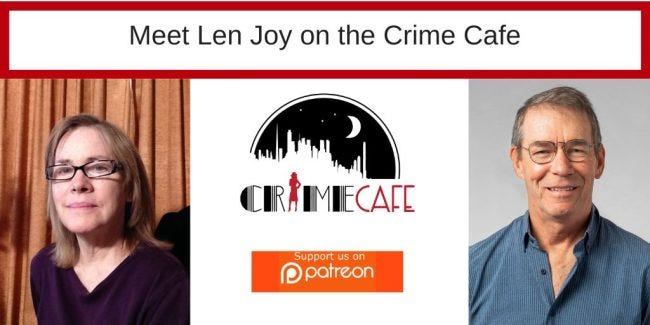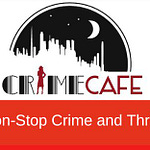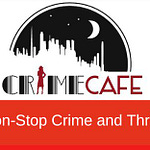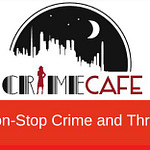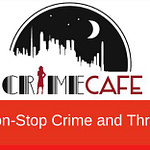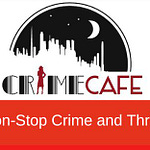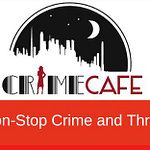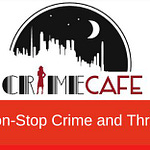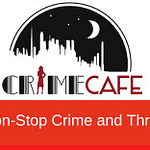This week's episode of the Crime Cafe podcast features my interview with crime writer Len Joy.
Get to know Len and his books, as well as his interest in athletics and how it has inspired his writing.
Before I bring on my guest, I’ll just remind you that the Crime Cafe has two eBooks for sale: the nine book box set and the short story anthology. You can find the buy inks for both on my website, debbimack.com under the Crime Cafe link. You can also get a free copy of either book if you become a Patreon supporter. You’ll get that and much more if you support the podcast on Patreon, along with our eternal gratitude for doing so.
We also have a shop now. Check it out!
Check us out on Patreon: https://www.patreon.com/crimecafe
The transcript can be downloaded here.
Debbi: Hi everyone. My guest this week is the award-winning author of several novels, including one that I read called Dry Heat, which I really liked a lot. Like many authors, he started off in another career before he started writing. It's my pleasure to introduce my guest Len Joy. Len, hi.
Len: Hi. Thank you very much for having me. I never thought of myself as a crime writer, but as I look at my work, I do have a lot of crime in there, so happy to be part of this.
Debbi: Absolutely. Well, I am glad to have you on, that's for sure. Now I finally have you . Okay. I wanted to ask you particularly about Dry Heat, because I loved it so much. What was it that inspired you to write this novel?
Len: Well, this was one of the few novels I think I wrote that was inspired by a specific incident. In my earlier career, I had an engine remanufacturing company in Phoenix with my brother-in-Law. We ran that for almost 20 years. It was a down and dirty, gritty, manufacturing operation. We had about 200 employees at any given time, and I had a very trusted employee, a woman and her husband that worked for me in the office. Their son, who I knew, I think he had just turned 18 and he was out hot rodding on the interstate on a Friday night, and not sure whatever happened, but they basically were dueling with another car and somebody in the vehicle he was in shot at the other car.
Didn't hit anybody, but it turned out that the other vehicle was driven by an off-duty policeman, and he was arrested. He was the only adult -18 years old - and the other three were underage, and he was charged with attempted murder of a police officer, which is a serious crime. I mean, it's more serious penalties, and even though nobody was hurt, I don't believe he was the one shooting, but nevertheless, he was arrested. I followed this with obviously the parents as a father, and I had a kid about the same age as Tim, and instead of going to college, he's going to trial, and they have this lawyer, and they're going to a pretrial conference. They're going to fight this. I think they have a good case. They come back in the afternoon and they tell me that they basically presented him with the alternative of if you lose at trial, you could go to jail for 20 years, or you can take a deal and you go to prison for three, and they took the deal.
But that just stuck with me, not just for the kid, but for the parents to have to make that decision in an instant, and it just changes the whole direction of your life. That was 20 years ago, and I started writing after that, and it was just something. I followed their story and he went to prison. He came out. I stayed in touch with his mother. My business ended in 2003, so I was no longer in Phoenix, but it was a story that interested me. And after I'd written a couple other novels, I decided not to use that story, per se. I mean, his story is his story, but that incident inspired me, I guess, in a way, to try to write about that kind of event where you're heading in one direction and something happens and your whole life changes.
And I like sports, so I always make it somehow an athlete involved. But that was the inciting incident, I guess, that got me to write up the book. The story is totally different, but I have shared it with my employee and with Tim who was the inspiration for it, and they liked the book so I'm satisfied and happy.
Debbi: That's great. Yeah. That's great. Wow, it all just seems so unfair and circumstantial, and yet this person just dealt with it.
Len: Yeah. I mean, you shouldn't be playing with guns, but cops shouldn't probably be driving up and down harassing people either. So it was ...
Debbi: Did he know there was a gun there? I mean, all those things.
Len: Yeah.
Debbi: Well. So tell me about your other books. How would you describe them generally? What genre?
Len: That's a good question on genre. Whenever I try to find it, I can't. It's like commercial, literary fiction, something, but there's the basic premise if I find a theme. Mostly I'm writing about people, mostly former athletes, just because that's something I can write about that I know, but it's their life after the cheering stops. In Better Days as an example, a high school basketball star Darwin Burr wins his state championship for a small town in Illinois. And when the story opens 20 years later, he's been coasting on that glory, if you will, for all those years, not really taking charge of his life, and the incidents in the story that forced him to get back in the game and take action.
Mostly I'm writing about people, mostly former athletes, just because that's something I can write about that I know, but it's their life after the cheering stops.
In American Past Time, the first book I wrote, that was in some degree inspired by I watch baseball a lot, and they had a pitcher for the Chicago Cubs who had a perfect game going right to the last pitch, literally, and the umpire on a close call called it a ball, so he lost his perfect game. He walked the runner, and I was like, all right, I'm going to use that somehow. I wrote a story about a minor league baseball player who does pitch a perfect game, but it injures his arm and he never makes it. He's going to make it to the majors, and then that causes him not to make it, and he goes to work in this factory in a small town. And it's the life lived after that, near almost making it. I always watch the Olympics and you see all these stories of glory and stuff. There's a lot of people who are really good athletes that don't make it that far but they work really hard and then they have to have another life afterwards. That interested me so I use that as fodder for the stories.
Debbi: That's fascinating. That's really interesting. How much research do you do when you're writing your books?
Len: Well, I'm very grateful for Wikipedia and Google.
Debbi: Aren't we all?
Len: I am. I do write about … Being a little older than a lot of writers, I have a lot of experience like manufacturing experience, so I use that. I don't branch off into something that I don't know anything about, because I don't have enough time, but using those years I wasn't writing as my experience base. A lot of them, I set in certain time periods, like the book I'm writing now. It's taking place in 1981. It's taking place over 30, 40 years, but I always go on to Wikipedia and see like, okay, we're in 1984 now. What happened in 1984? I want to make an incident so I can anchor the readers. It's going to be like June or July, and then I look and I say that was when OJ had his slow speed police chase so that's an event I can have him watching with his buddies on the bar because I was doing that, and people can relate to that if they were around at that time.
Debbi: Very interesting. I like the idea of writing about the past because then I don't have to worry about technology as much.
Len: Yeah. I mean, cell phones changed everything, like for writing scenes. If you look at a Law & Order in the pre-cell phone age, it's a different timing of the scene because they have to, they have to call into the office or the dispatch and, and now everything is zoom, zoom, zoom like, it's just …
Debbi: Exactly. Yeah, it's wild. What kind of writing schedule do you keep?
Len: Well, I work out every morning. I'm a triathlete and I have sort of a very scheduled swim or bike or run, and I walk my dog in the morning early. I always say I start about 10 o'clock, but I thought about that and really from about 10 to noon, it seems like I'm doing other stuff, like checking the email and reviewing. I look at the books and how they're doing on Amazon, but usually start by noon. I try to get a couple, two, three hours in, and I'm generous in what I do. I also spend a lot of time reviewing other people, which I think is part of my reviewing or my writing process because it helps to see what other people are doing and what works and doesn't work.
I work out every morning. I'm a triathlete and I have sort of a very scheduled swim or bike or run, and I walk my dog in the morning early.
I try to get two or three hours in every day, maybe not on Sunday or something, doing something else. But I think as a triathlete and someone training, there's sort of a good complimentary discipline. I mean, they're both things where you're doing it every day. You're not showing up on race day and expecting to run in a marathon or whatever. I wrote a lot of short stories and I like flash fiction and even some poems, but I think novels have worked the best for me because it's just something I can plot out and take a day at a time and just keep working at it. It takes about a year and a half, two years, it seems like to get it finished.
I wrote a lot of short stories and I like flash fiction and even some poems, but I think novels have worked the best for me because it's just something I can plot out and take a day at a time and just keep working at it.
Debbi: Yeah. Yeah, exactly. You take your time with it. You build it out, just bit by bit. Stick with it.
Len: I like to go back and forth. Some people write the whole thing and then revise. I like to revise, so I just write one day and then I'll revise what I wrote the next day. Usually when I finish my draft, it's a pretty clean draft. The story might not work and I need to fix that, but it's not rough. It's readable anyway, so I can find someone to make them read it.
Debbi: Yeah. That's good. That's a good way to do it. What advice would you give to anyone who's interested in a writing career?
Len: I think the advice I would give someone like me that's come out of school ... I wanted to be a writer when I was in school, and I got sort of crushed by an English professor when I was like 18 and impressionable and decided I didn't have the skills to write. So I just changed my major. It was probably better for me. I went into business, but I would say a couple things. It's good to get feedback. Don't take it to heart, which is easy to say. It's tougher when you're young. Now, I look back at the critiques and they weren't that bad. I mean, I shouldn't have been so sensitive about it.
But most importantly, when I went back to 2003, I got this flyer from the University of Chicago's Graham School offering a creative writing course, and just on a whim I took it. But learning, thinking you can write, it's just like training. I mean, you need to be trained. You need to take classes, I think, most people. Some people are just gifted natural writers, but there's just a lot of building blocks. How to set scenes, how to write dialogue, punctuation and simple things like that. You just need to learn that.
Some people are just gifted natural writers, but there's just a lot of building blocks. How to set scenes, how to write dialogue, punctuation and simple things like that. You just need to learn that.
I felt fortunate I went to Iowa School of the Festival, not the MBA or the MFA program, but they had great classes and building blocks, try to write a story in 300 words, which is a great discipline to have and just because then you learn not to get bloated, long novels like a lot that I read.
Debbi: Yes, yes. There's a lot of that out there, unfortunately. What authors have inspired you most, your own writing? What authors do you look to for inspiration?
Len: Well, I like Elmore Leonard. Earlier I think Hemingway, because I write purely spare writing. Not a lot of rumination, not a lot of introspection. Maybe not enough, but I like to read those writers like that and Richard Price, just for how they do something, construct scenes and tell stories through dialogue, which is how I mostly convey my stories. But I have to say before I was writing, I was trying to read everything Joyce Carol Oates wrote, which is almost impossible. I don't know how anyone can write that much. I don't even know how to pigeon hole or typecast her. I mean, she just writes about so many different subjects and it's just impressive. That's one of my favorite authors, I guess.
Debbi: Very cool. And what are you working on now?
Len: Well, the first novel I wrote was called American Past Time, and it was about Dancer Stonemason, a young Minor League pitcher, and his career unravels when he can't make it to the majors. It's a story that really covers the post-war era from the early '50s through the Vietnam War. He's got two sons and a wife and had lots of difficulties. Originally what I had when I tried to get it published was a 50 year saga that went through like 2000. I got someone at Grove Atlantic to read it. I had some contact there, and they weren't discouraging, but they said it's too long, especially for a debut novelist. You need to cut it in half, which is tough. It was helpful advice and I did.
I stopped it. I cut out a whole storyline and characters and generations and finished it, and it was a good first novel, I think. But I had all this material, and after I wrote Better Days, which was my second novel about the basketball player, I thought, no, I'll use that somehow and I ended up after a lot of permutations writing, taking the same character who was a young man in the '50s and making him, I would call him an old man, but he is probably about my age now. But he's at the end of his life or getting closer to it.
The whole novel, it's in the same small town in Missouri, and it takes place. It's really a road trip story between him and a young soldier, but a tornado is descending on the town, and the whole novel takes place in a single day. So it was a nice change, a nice framework. I went from 30 years to one day.
Debbi: Wow.
Len: It's a different kind of writing challenge. So to answer your question though, then I'm writing now the story that will make this a trilogy, because it's going to bridge the estranged son of Dancer Stonemason from his boyhood up through 2003. So it'll end just before Everyone Dies Famous, my third novel, begins.
Debbi: Wow.
Len: People like series I've been told, so now I'll have a series, but it is a standalone novel, but hopefully all the people that read the other two novels will also buy that one and be entertained.
Debbi: So it's kind of a quasi-series, sort of a series that you've cobbled together almost accidentally
Len: Right.
Debbi: Wow. That's pretty cool. I was going to ask you ...
Len: I could have a box set.
Debbi: I was going to ask you if you were thinking about doing a series at any point, and apparently you are.
Len: In a way, yes.
Debbi: In a way, kind of a series. Interesting! Linked standalones called maybe. Yes, you can call that a series as far as I'm concerned. Is there anything else you'd like to add before we finish up?
Len: No, I appreciate this opportunity. I love to talk about my books and writing, and I like to meet other writers, so I hope people are interested in what I'm doing. I have a nice email newsletter I send out, so I'd love to get people to sign up for that at some point. I'm not too harassing. I just send something out about once a month. I try to promote other indie writers and do reviews, make some use out of the reviews I've written and share them with other readers.
Debbi: That's a laudable thing, promoting others.
Len: Yeah. I think you have to do that.
Debbi: I think we all should just all get together and promote each other, frankly, because we can all use the help . I think that's it then if you feel like you've said everything you want to say.
Len: Yeah. I think so. Thank you.
Debbi: Okay. Well, it's been a pleasure having you on. Thank you so much for being with us.
Len: My pleasure.
Debbi: And, on that note, I'll just say to everyone, thanks for listening. If you enjoyed the episode, please leave a review, and if you would, subscribe to the YouTube video or give us a like there, both hopefully and check us out on Patreon. I have a Patreon page where I have bonus episodes, ad-free episodes, and all sorts of other perks for Patreon supporters. So until next time, when my guest will be Charles Salzberg, take care and happy reading.





